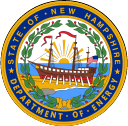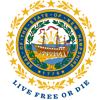News
Contact
Coming to Portsmouth on March 30: Talk Back to Our Regional Grid Operator!
ISO New England's Consumer Liaison Group to hold rare meeting in New Hampshire
What is the most powerful but little-known organization in New England -- the one that runs our electricity grid, oversees wholesale electricity trading, and operates our high-voltage interstate transmission system? Why that would be ISO New England, of course, the federally regulated "regional transmission organization" (RTO) that serves the electricity users of all six New England states.
A nonprofit organization, ISO New England is governed by an unelected Board of Directors and is subject to oversight by the Federal Energy Regulatory Commission (FERC). It does not report to the New Hampshire Public Utilities Commission or any other state regulator. Attached to ISO New England is a powerful stakeholder 'advisory' body known as NEPOOL, whose meetings are not open to the public and whose voting rules are jiggered to allow the industry's legacy interests (i.e., the owners of big generation facilities and transmission lines) to dominate. We're talking about companies like Constellation (owner of Mystic Station near Boston, the region's largest generator), NextEra (owner of the Seabrook nuclear power plant), Eversource (which owns lots of transmission lines) and National Grid (same).
Given that consumers end up paying for the electricity grid, and of course are absolutely dependent on it, what voice to ratepayers have in the governance of ISO New England? The answer is "none." But there is the ISO New England Consumer Liaison Group (CLG).
The CLG -- whose meetings are open to the public -- convenes four times a year. Two of those annual meetings are in Massachusetts. The other rotate among the other five states, and now it is New Hampshire's turn. The next meeting of the CLG will be in Portsmouth, from noon to 3:30 p.m., at the AC Hotel Portsmouth Downtown on 299 Vaughan Street. We hope to see a huge turnout of New Hampshire ratepayers.
Via a 2008 decision known as Order 719, FERC laid out what it expects of RTOs like ISO New England. Customers, ruled FERC, "should have some form of effective direct access to the RTO . . . board of directors." Added FERC, each RTO's business practices "must provide for stakeholder input" as well as "mechanism to provide feedback to stakeholders to ensure that information exchange and communication continue over time."
The CLG is ISO New England's answser to that "effective direct access" requirement. Is it adequate? Well, Consumer Advocate Donald Kreis has publicly called for the abolition of the Consumer Liaison Group, dismissing it as a mere "coffee klatch."
But . . . you should come and see for yourself. There will be at least one high official of ISO New England present. (Typically, it's one of the vice presidents.) That person will likely make a presentation about the latest developments at ISO New England, answer questions from the floor.
The actual agenda for the March 30 meeting of the CLG is still being worked out, but it looks like the meeting will be focused on the issues we're raising here? What is ISO New England? What does it do? What is the Consumer Liaison Group? Does it really provide the required "effective direct access" for consumers? If not, what if anything can we do about it?
ISO New England typically requires preregistration for the meeting -- we will post all of the relevant details when we know them -- and there is typically a 'free' lunch for attendees. We've enclosed 'free' with the proverbial air quotes because ultimately we're all paying for the food via ISO New England charges that are embedded in our transmission and energy charges.



